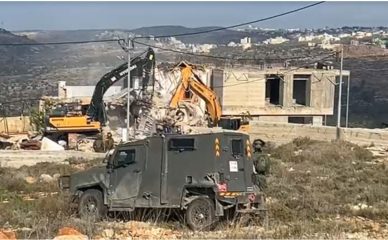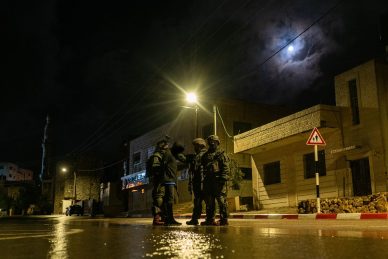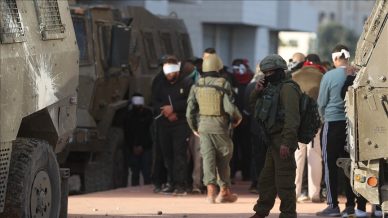WEST BANK, (PIC)
Israel’s ongoing war on Gaza is not only about eliminating Hamas, disarming the resistance, or displacing Palestinians from Gaza. A larger objective looms: seizing control of the West Bank by expanding settlements and pushing forward annexation plans to ultimately drive Palestinians out and turn the territory into Israeli land.
Israeli Prime Minister Benjamin Netanyahu strongly backs former Israeli premier Yitzhak Shamir’s scheme to settle two million Israelis in the West Bank, seeing it as a key strategy to solidify Israeli control and block any political settlements that could harm Israeli interests. Settlement expansion and annexation efforts, ongoing since 1967, have accelerated significantly under Netanyahu’s far-right government, particularly after the events of October 7, 2023, as global attention remains fixed on Gaza.
Major road projects
Netanyahu’s government has introduced laws facilitating the annexation of the West Bank, including one bill approved by the Ministerial Committee for Legislation to rename the West Bank “Judea and Samaria” in Israeli law. Additionally, the chairman of the US House Foreign Affairs Committee directed staff to use “Judea and Samaria” in official correspondence, further legitimizing the annexation move.
Israel is currently implementing a massive project to carve hundreds of kilometers of new roads throughout the West Bank, officially framed as “infrastructure improvements for Palestinians.” However, the real aim is to link Israeli settlements more closely with cities inside Israel’s 1948 borders, effectively solidifying Israeli control over the territory.
In 2024 alone, Netanyahu’s government allocated 3.1 billion shekels ($838 million) for these new roads. Many are illegal under international law and disrupt Palestinian life, fragmenting communities and increasing their isolation.
Establishing sovereignty
The goal, according to Israeli officials, is to anchor one million settlers in the West Bank and enforce Israeli sovereignty over the area. An investigation by the “Shomrim” website revealed that around 100 kilometers of new roads — many illegal — were built within just a year amid the Gaza war, further cementing Israeli demographic and political dominance.
Expansion of settler outposts
Despite occasional demolitions, illegal settler outposts like “Nahalat Zvi” north of Jerusalem have been reestablished during the Gaza war. Journalist Daniel Dolev reports that Netanyahu’s government proudly publicized the expansion of this outpost and the construction of a new connecting road, with work carried out discreetly at night in October 2024.
Traditionally, settlement expansion was measured by the number of new housing units. Today, Dolev notes, the focus has shifted toward building new roads, with billions of shekels in government funding. These roads not only expand settlements but also block Palestinian access to their lands and reshape the West Bank’s geography, making any future separation nearly impossible.
Support for settlement farms
Settlement farms across Palestinian territories receive broad governmental support, a trend that accelerated under Netanyahu. Settler leaders openly state their aim to seize as much land as possible with minimal settlers. Israeli Finance Minister Bezalel Smotrich and Settlement Minister Orit Strock have distributed dozens of SUVs to settlers to expand their control over rural areas, arguing that grazing livestock prevents Palestinian access.
Roads leading to these farms and outposts play a crucial role, enabling settlers to move rapidly and facilitating land seizures. According to Yotam Cohen from the “Torat Tzedek” organization, these roads also escalate settler violence against Palestinians.
139 illegal roads
Israel rarely publishes official information about new West Bank roads. However, an upcoming “Peace Now” report, based on aerial imagery, found that between mid-2023 and mid-2024, 139 illegal roads totaling 116 kilometers were constructed — not including dirt roads. Many of these roads serve new or expanded outposts and were built without permits, with two-thirds crossing privately-owned Palestinian land and being restricted to settlers.
Direct government support
The construction of these illegal roads is directly supported by government budgets. The Settlement Division of the World Zionist Organization, funded by the Israeli government, spent approximately 75 million shekels ($20.3 million) in 2023 to support illegal settlement farms and outposts, including 7.7 million shekels specifically for road construction.
The Israeli Ministry of Settlement also funds “Land Patrol Units” operated by settlement councils, allegedly to prevent “illegal Palestinian construction,” but in reality, to develop infrastructure supporting settlement expansion.
Documents reveal that in 2023, the Hebron Hills settlement council received 1.1 million shekels to build a road near Susiya to strengthen control over the Masafer Yatta area. Gush Etzion Council got 958,000 shekels for road upgrades south of Jerusalem, and the Binyamin Council near Ramallah received about 1.9 million shekels for six road projects.
According to Yoni Mizrahi of “Peace Now,” roads have become a primary tool for land seizures without needing large numbers of settlers: a few families can control vast areas thanks to these roads.
Choking Palestinian communities
The expansion of the settlement road network severely restricts Palestinian access to land and movement. Even when roads appear empty of settlers, Palestinians feel their lands are being stolen in plain sight.
Highway expansions
Besides illegal roads, Israel is expanding major highways to better integrate settlements into Israeli urban centers like Tel Aviv, blurring the Green Line separating Israel from the West Bank.
During her term, Transport Minister Miri Regev promoted a plan to connect settlements with the rest of Israel, aiming to cement Israeli sovereignty. Yoni Danino, head of the Settlement Administration, noted that road upgrades would make traveling through the West Bank more attractive for Israeli commuters, reinforcing Israeli control.
Traffic separation
In July 2023, Israel’s “Netivei Israel” company outlined nine West Bank road projects costing about 3.1 billion shekels. In 2023, the “Al-Arroub bypass road” near al-Khalil and the “Huwara bypass road” south of Nablus were opened at a cost of about 550 million shekels. Plans are also underway to construct the “Fabric of Life” bypass road to connect Ma’ale Adumim to Jerusalem, separating Palestinian and Israeli traffic.
A central focus is Highway 60, running from northern to southern West Bank. Researcher Shaul Arieli explained that new roads aim to improve access to isolated settlements like Elon Moreh, Itamar, Bracha, and Yitzhar, strengthening their permanence through massive infrastructure investments.















